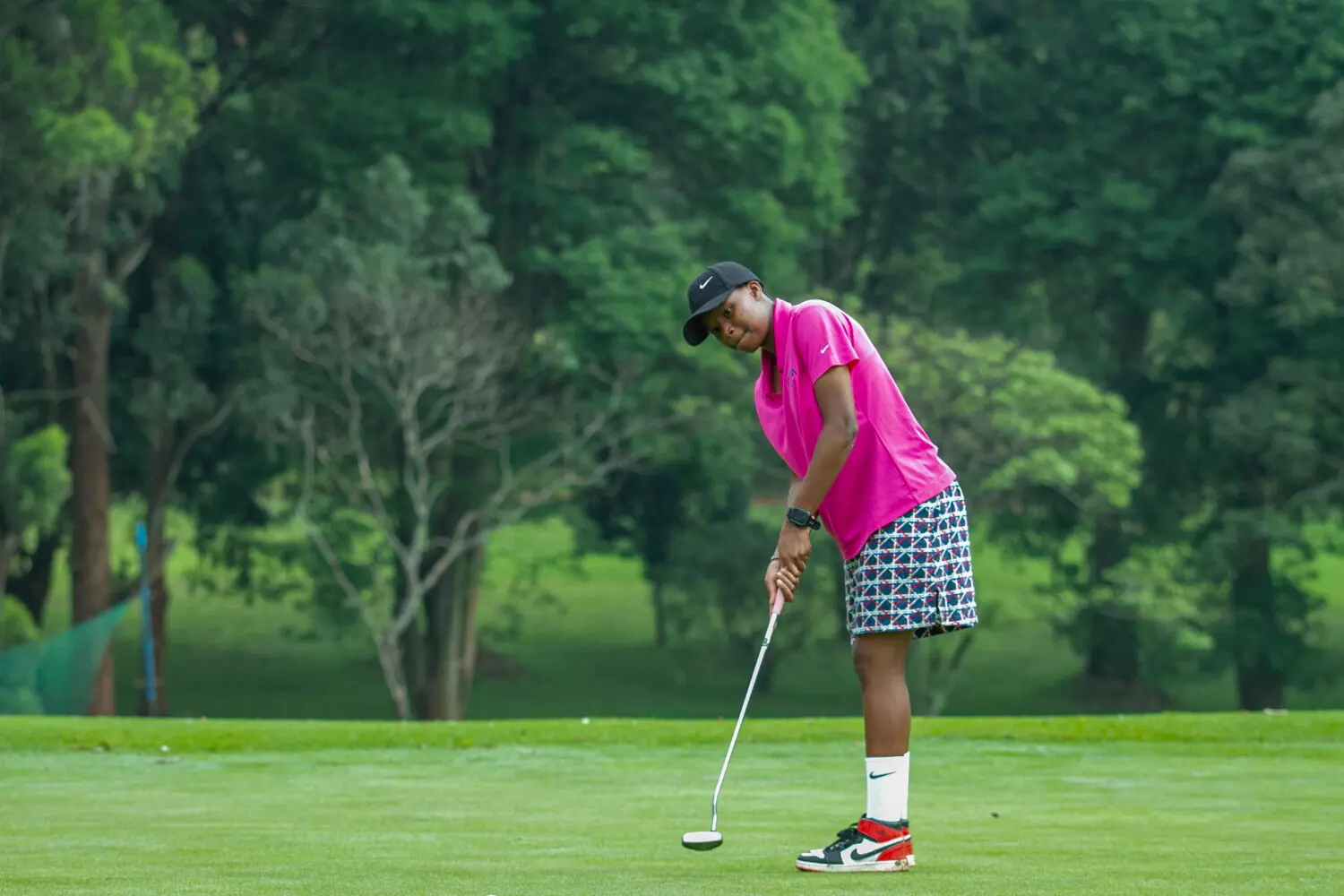The Tokyo stage is almost set, and Kenyan athletes at Tokyo 2025 Deaflympics are stepping forward with a blend of grit and belief, ready to test themselves against the best from around the world between November 15 and 26 in Japan. From the fairways to the track, the pool and the handball court, Team Kenya carries rich human stories that make this campaign feel bigger than medals alone.
What stands out in this build-up is not only talent, but the persistence behind it. Seasoned competitors are returning wiser, while ambitious debutants are eager to rewrite what is possible for Kenyan sport.
Golf leads Kenya’s charge to Tokyo
Few narratives are as compelling as Isaac Makokha’s. The 33-year-old Vet Lab Sports Club golfer became the first Kenyan to win a Deaflympics golf medal when he clinched bronze in Brazil in 2022, beating Germany’s Guldan Nico by two up. Now, after sharpening his game against top opposition in local events, including triumph at the 2025 NCBA Railway Invitational against able-bodied stars such as Michael Karanga, he says he is ready to climb the final step.
“I have practiced well and my body feels great. I am optimistic about converting that bronze from Brazil into gold in Tokyo,” said Makokha after a session at Vet Lab.
Makokha’s route to Tokyo was earned the hard way. He topped a pool of 15 local deaf golfers through strokeplay and matchplay, and he has not shied away from high-calibre company in the Sunshine Development Tour East Africa Swing. The confidence is palpable, but so is the clarity, because German ace John Allen, the reigning champion who denied him gold in 2022, is still a looming obstacle.
“Allen is a strong opponent but I am ready to face him head-on. My game is better, my body is in top form, and I believe I can beat him this time,” he said.
There are practical hurdles too, including the lack of proper equipment for deaf golfers in Kenya, an issue the player himself has flagged. Even so, Team Kenya coach David Kihara senses Makokha’s moment has arrived.
“He has trained hard, competed in several demanding tournaments, and I believe this time he is ready to bring home something bigger than bronze,” said Kihara.
Why Makokha believes Tokyo can sparkle for him is straightforward
- experience from Brazil has refined his strategy and mental edge,
- regular battles against able-bodied fields have toughened his execution,
- and a healthy, flexible body has restored freedom in his swing.
A teenage trailblazer prepares for a historic tee shot
Alongside Makokha, 19-year-old Jacinta Njeri will make her Deaflympics debut, poised to become the first ever Kenyan lady golfer to play at the Summer Games. A Form Two student at Ngala Secondary School for the Deaf in Nakuru County, the handicap 20 player has pieced together an eye-catching run on local courses and is now alternating training at Railways, Muthaiga and Vet Lab.
“When I go to Tokyo, my target is to play a good round of golf and get a gold medal. I hope that the four of us can reach the podium to make the country proud,” said Njeri, who credits the experienced trio of Makokha, Gilbert Alikula and Adan Wario for mentorship.
Her ambition goes beyond medals. Njeri wants her participation to inspire more women with hearing impairments to pick up clubs and walk the fairways with pride. She started golf in 2022 after being inspired by her coach, Vet Lab resident pro Shem Orwenyo, and says the sport helps her relax and connect with fellow golfers. Communication, especially when competing against hearing players, remains her toughest hurdle, but her resolve beams through.
“She is young, she is strong, she is committed. The girl has potential to be a great player,” said coach Kihara, tipping Njeri and the entire golf team for a strong Tokyo showing.
Decathlon belief grows for Dickson Rawino
On the track and in the field, 35-year-old Dickson Rawino carries the whole decathlon on his shoulders as Kenya’s lone entrant in the ten-discipline test of endurance and versatility. He placed sixth in 2022 in Brazil, a near miss that has shaped the hunger and precision of his build-up for Tokyo.
“I am feeling good to again represent Kenya in the Deaflympics, and my goal is to finish position one, two or three,” said Rawino, who hails from Gem in Siaya County.
Rawino’s preparations have been practical and thoughtful. He qualified by winning national trials that attracted five decathletes, and he has leaned into regular training with hearing athletes to access facilities and competition that sharpen his technique across events like the pole vault and 110m hurdles. He openly acknowledges how crucial the right equipment has been to his progress.
“Practicing with the hearing group has elevated my performance. I have built the endurance and mental toughness needed for a victory,” he said, noting the value of proper mattresses for pole vault and hurdles for the 110m hurdles.
There is a proud family line to his sprinting heritage too, as he follows in the footsteps of his father, Andrew Rawino, who did not get the chance to represent Kenya. Team Kenya athletics coach Samuel Kibet has watched the multi-event demands closely and believes the athlete is trending toward the peak window.
“He is doing very well and every day he has been improving. We believe he is a man to watch this time,” said Kibet, adding that the staff is planning event by event to make him a more complete competitor.
CASINO BONUS INFO RATING
- See 11 Bonuses
- See 5 Bonuses
BK 000678
- See 18 Bonuses
- See 3 Bonuses
Handball squad leans on chemistry and hard lessons
Battle-tested would be an apt label for the Kenya Deaf Men’s Handball team. For two seasons they have lined up against hearing teams in the Kenya Handball Federation Men’s National League, a bold choice that delivered both bruises and belief, including a finish of 20th out of 25 teams last season and a handful of impressive wins.
“We were good because the able team is more advantaged than us, they can hear the whistle, unlike us. If we can win some matches against the hearing sides then we are better,” said coach Jack Habert, whose confidence has risen before Tokyo.
Tokyo will be only their second Deaflympics appearance in men’s handball after finishing sixth on debut in Brazil in 2022. The draw is formidable. Kenya is in Group B with Croatia, Serbia and France, while Group A features Japan, Germany, Turkey and Brazil, a constellation of pedigreed opponents that will test the team’s poise.
Preparation has focused on cohesion and tempo. The 18-man squad is training at Nyayo National Stadium in Nairobi and only five players are new, a continuity advantage that Habert expects to pay dividends in tight games. Kenya qualified for Tokyo as African champions, and the staff has shifted focus to making the team more aggressive without losing structure.
“They have the chemistry of play,” said Habert. “This is why I am telling you I have confidence in this team.”
Captain Joel Kiilu speaks with the conviction that comes from scars and growth. He points to lessons learned from both the World Deaf Handball Championships in Brazil and the last Deaflympics, and he sees tangible improvement in attack and overall flow.
“We are going to the Deaflympics a better side, so I am sure there is a medal coming home with us,” said Kiilu, a sentiment that mirrors the mood around camp.
Swimming finds its captain in Francis Gichuhi
Some journeys begin with a turn that could have ended them. For 24-year-old swimmer Francis Gichuhi, hearing loss arrived at age four after a meningitis diagnosis, one year after he first learned to swim at Aga Khan School in Nairobi. The aftermath was hard, his parents struggled to accept the change, his schooling was interrupted, and he joined a deaf school late, yet the pool kept its hold on him.
“I am delighted to be selected to represent the country in the Deaflympics and to be named the team’s captain. It is something I have been dreaming of since 2019,” said Gichuhi after training at the Kasarani Aquatic Stadium.
Gichuhi will compete in the 50m backstroke, 50m breaststroke and 100m breaststroke, his first international event representing Kenya. He leads a team of eight swimmers, a group that includes Lilian Njeri, Faith Wayua, Jimale Suheib, Salim Mbaraka, Hamadi Ali, Hassan Hamisi and Yusuf Saddam. All eight earned their spots at trials held at United States International University – Africa, and each will contest more than one event.
Training is centered on speed and endurance, and the captain, who counts Michael Phelps as a role model, talks about the sport’s physical and mental benefits with warmth and conviction. Kenya’s deaf swimming coach Irene Kerubo is plotting the final push at a residential camp, and she sees opportunity especially in the middle distances, a space where the team has progressed in recent sessions.
“For the middle distances, which are 100m and 200m, I think we are going to get medals,” said Kerubo, noting steady improvement since the squad started training.
There is institutional belief behind them as well. Kenya Deaf Swimming Federation Secretary General Charles Odira is pleased that the sport is part of the country’s Tokyo contingent, and he frames the trip as a chance to showcase capability at the highest level.
“We are going to Tokyo to represent Kenya and show that we are also capable of shining on the global stage. We promise to bring a medal from Tokyo,” said Odira.
Key dates and disciplines to watch
As the competition nears, the schedule and breadth of Kenya’s participation add texture to the story. Tokyo 2025 is set for November 15 to 26, and Kenyan teams are primed across multiple fronts.
- golf, with Isaac Makokha, Jacinta Njeri, Gilbert Alikula and Adan Wario leading the way,
- athletics, where decathlete Dickson Rawino aims for the podium,
- men’s handball in Group B against Croatia, Serbia and France,
- swimming led by captain Francis Gichuhi,
- women’s basketball also listed among Kenya’s entries.
The heartbeat behind Kenya’s pursuit
There is a common thread in these stories, a willingness to step into uncomfortable arenas to get better. Golfers practicing across Nairobi clubs, a decathlete grinding through ten disciplines with the help of hearing training partners, handballers taking on a national league of hearing teams, swimmers spending long hours honing strokes at Kasarani, each thread speaks to preparation forged in adversity.
It is also about representation and the doors it opens. Njeri’s debut can become a beacon for young girls in schools like Ngala Secondary School for the Deaf, while Makokha’s sustained excellence gives aspiring golfers a map to follow. Rawino’s multi-event quest carries the quiet pride of a family name, and Gichuhi’s captaincy reflects years of persistence that turned a personal challenge into national honor.
There are no guarantees in sport, and Tokyo will offer no favors. Yet the blend of experience and youthful ambition inside Team Kenya suggests a campaign that can both inspire and contend. The medals talk is not bravado, it is grounded in hard training, smarter systems and a growing belief that Kenyan athletes with hearing impairments can compete and win on the world stage.
What success would mean for Kenya
Results will always matter, but the legacy piece matters too. Success in Tokyo can accelerate support for better equipment in golf, sustained access to multi-event facilities in athletics, expanded competition pathways for handball, and more structured high-performance programs in swimming. In turn, that infrastructure would make the next cycle less about overcoming scarcity and more about maximizing talent.
For now, as the final practices wind down in Nairobi at Vet Lab, Muthaiga, Railways, Nyayo and Kasarani, the mission is simple. Keep polishing the details, trust the work, travel to Tokyo with calm minds and brave hearts, then let performance speak for itself.
Kenya’s hopes are honest and ambitious, and the cast is compelling. If the past three years have taught these athletes anything, it is that the line between history and heartbreak can be razor thin, and that is precisely why this team feels ready to run toward the pressure and make it their ally.










